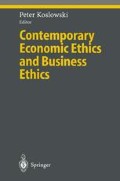Abstract
The merger of two disciplines always implies that the synergetic effect works both ways. Both disciplines take over concepts of the other discipline and gain by the merger of their own concepts with those concepts they take over from the other side. In the case of the merger of ethics and economics the same process is effective. Ethical economy implies as well the use of ethical concepts in economic analysis as the use of economic tools or economic concepts in philosophical ethics. The second interdisciplinary transfer from economics into ethical theory has not attracted so much scholarly attention yet although there are still many synergetic effects to be won in this transfer. It will however not be in the centre of this paper.
Access this chapter
Tax calculation will be finalised at checkout
Purchases are for personal use only
Preview
Unable to display preview. Download preview PDF.
References
Cf. Peter Koslowski: Prinzipien der Ethischen Ökonomie, Tübingen (Mohr Siebeck) 2nd edition 1994.
Cf. Karl Homann, Franz Blome-Drees: Wirtschafts- und Unternehmensethik, Göttingen (Vandenhoeck &; Ruprecht) 1992.
L. von Mises: “Soziologie und Geschichte. Epilog zum Mehodenstreit in der Nationalökonomie”, Archiv für Sozialwissenschaften und Sozialpolitik, 61 (1929), pp. 465–512, and
A. Schütz: Der sinnhaftte Aufbau der sozialen Welt. Eine Einleitung in die verstehende Soziologie (1932), Frankfurt am Main (Suhrkamp) 1971, pp. 342ff.
Cf. Schütz, ibid., p. 340.
Cf. for Schmoller P. Koslowski: “Ethical Economy as Synthesis of Economic and Ethical Theory”, in: P. Koslowski (Ed.): Ethics in Economics, Business, and Economic Policy, Berlin, Heidelberg, New York (Springer) 1992, pp. 15–56 (= Studies in Economic Ethics and Philosophy, Vol. 1) .
Cf. P. Koslowski: “The Social Market Economy: Social Equilibrium of Capitalism and Consideration of the Totality of the Economic Order. Notes on Müller-Armack”, in: P. Koslowski (Ed.): The Social Market Economy. Theory and Ethics of the Economic Order, Berlin, Heidelberg, New York (Springer) 1998, pp. 73–95 (= Studies in Economic Ethics and Philosophy, Vol. 17).
L. von Mises: Human Action. A Treatise on Economics, New Haven (Yale University Press) 1949, p. 18.
K. Popper: “La rationalité et le statut du principe de rationalité”, in: J. Rueff, E. M. Claassen (Eds.): Les fondements philosophiques des systèmes économiques, Paris (Payot) 1967, pp. 142–150.
L. Wittgenstein: Tractatus logico-philosophicus (1921), Frankfurt am Main (Suhrkamp) 14th edition 1979, p. 76, proposition 5.473.
Ibid., p. 105, proposition 6. 3211.
Ibid., Preface.
In Gadamer there is however a reduction of the Geisteswissenschaften to a hermeneutics of text that is not characteristic for the older tradition of the Geisteswissenschaften that is more orientated towards the unity of the social, cultural, and human sciences.
Cf. Eduard Spranger: “W. Dilthey, Gedächtnisrede”, in: E. Spranger: Vom pädagogischen Genius. Lebensbilder und Grundgedanken groβer Erzieher, Heidelberg (Quelle & Meyer) 1965, p. 210.
Eduard Spranger: Kulturfragen der Gegenwart, Heidelberg (Quelle & Meyer) 1953.
Editor information
Editors and Affiliations
Rights and permissions
Copyright information
© 2000 Springer-Verlag Berlin Heidelberg
About this chapter
Cite this chapter
Koslowski, P. (2000). The Theory of Ethical Economy as a Cultural, Ethical, and Historical Economics: Economic Ethics and the Historist Challenge. In: Koslowski, P. (eds) Contemporary Economic Ethics and Business Ethics. Studies in Economic Ethics and Philosophy. Springer, Berlin, Heidelberg. https://doi.org/10.1007/978-3-662-04072-0_1
Download citation
DOI: https://doi.org/10.1007/978-3-662-04072-0_1
Publisher Name: Springer, Berlin, Heidelberg
Print ISBN: 978-3-642-08591-8
Online ISBN: 978-3-662-04072-0
eBook Packages: Springer Book Archive

